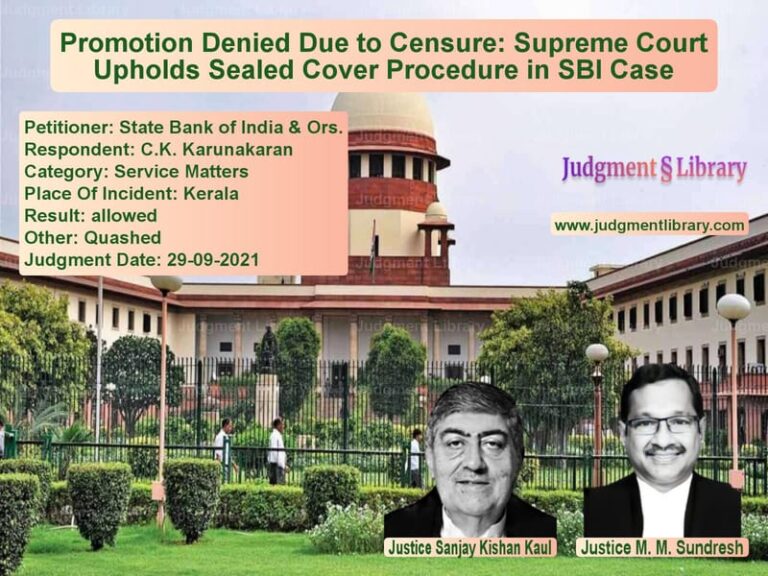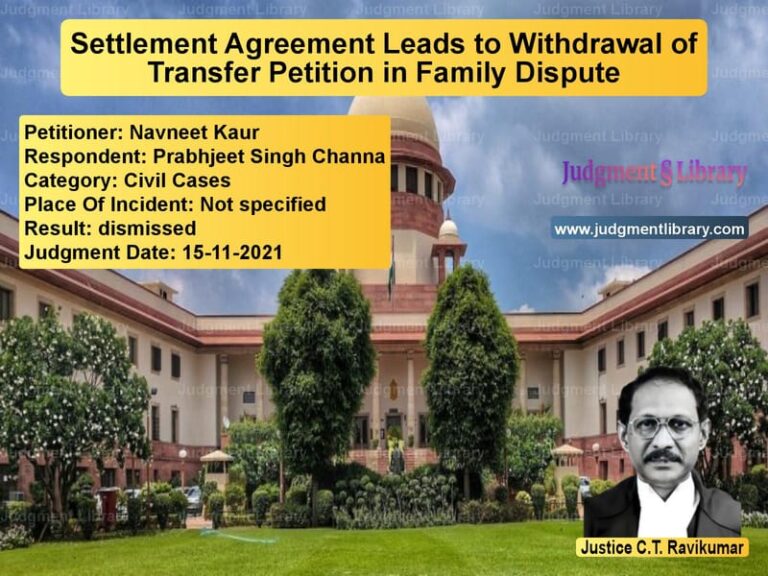Arbitration and Jurisdiction: Supreme Court Rules on IMAX vs. E-City Entertainment Dispute
The Supreme Court of India delivered a significant judgment in the case of IMAX Corporation vs. M/S E-City Entertainment (I) Pvt. Ltd., addressing the crucial issue of jurisdiction in international arbitration. This case revolved around whether an arbitration award rendered in London under the ICC Rules could be challenged under Section 34 of the Indian Arbitration and Conciliation Act, 1996. The Supreme Court ruled that the challenge under Section 34 was not maintainable as Part I of the Arbitration Act was excluded.
Background of the Case
IMAX Corporation entered into an agreement with E-City Entertainment for the supply of large-format projection systems for cinema theaters in India. The agreement contained an arbitration clause stating that any dispute arising would be resolved through arbitration under the ICC Rules of Arbitration. The agreement also provided that it would be governed by the laws of Singapore and that the parties would submit to the jurisdiction of Singapore courts.
Disputes arose between the parties, leading IMAX to initiate arbitration proceedings before the International Chamber of Commerce (ICC). The ICC determined that the arbitration would take place in London, United Kingdom. The arbitral tribunal issued three awards:
- First Partial Final Award (11.02.2006): Held that E-City was in breach of contract.
- Second Partial Final Award (24.08.2007): Determined the quantum of damages, awarding IMAX $9.4 million.
- Third Final Award (27.03.2008): Addressed interest and costs, awarding additional sums to IMAX.
Challenge Before the Bombay High Court
Despite the arbitration being conducted in London, E-City challenged the awards before the Bombay High Court under Section 34 of the Arbitration Act, which allows courts to set aside arbitral awards. IMAX objected, arguing that the arbitration agreement had excluded Part I of the Act, making Section 34 inapplicable.
The Bombay High Court ruled in favor of E-City, holding that the challenge under Section 34 was maintainable. IMAX appealed to the Supreme Court.
Key Legal Issues
- Whether an arbitration award rendered in London could be challenged under Section 34 of the Arbitration Act.
- Whether the parties had excluded Part I of the Arbitration Act through their agreement.
- The significance of the seat of arbitration in determining applicable laws.
Arguments of the Petitioner (IMAX Corporation)
IMAX argued that:
- The arbitration clause in the agreement provided for arbitration under the ICC Rules.
- The ICC Rules empower the arbitral tribunal to determine the seat of arbitration, which was fixed as London.
- The governing law of the contract was Singapore law, indicating that Indian courts lacked jurisdiction.
- As the arbitration took place in London, the procedural law governing the arbitration was English law, making Part I of the Indian Arbitration Act inapplicable.
Arguments of the Respondent (E-City Entertainment)
E-City countered that:
- The agreement did not explicitly exclude the application of Part I of the Indian Arbitration Act.
- Section 34 should apply as the parties had business operations in India, making Indian courts an appropriate forum for challenging the award.
- The seat of arbitration alone should not determine whether Indian courts have jurisdiction.
Supreme Court’s Observations
The Supreme Court examined the arbitration clause and the ICC Rules, noting that:
“When parties agree to arbitration under the ICC Rules, they implicitly accept that the ICC may determine the seat of arbitration. Once the seat is determined, the law of that jurisdiction governs the arbitration.”
The Court also cited its previous decisions, emphasizing that the seat of arbitration plays a decisive role in determining the governing law.
Key Rulings by the Supreme Court
- Exclusion of Part I: The Court ruled that by agreeing to arbitration under the ICC Rules and allowing the ICC to fix London as the seat, the parties had implicitly excluded Part I of the Indian Arbitration Act.
- Jurisdiction of Indian Courts: Since the arbitration was seated in London, the awards could only be challenged in courts under English jurisdiction.
- Reversal of Bombay High Court’s Decision: The Supreme Court held that the Bombay High Court had erred in assuming jurisdiction and set aside its order.
Conclusion
This judgment reinforces the principle that the seat of arbitration is the key determinant of the procedural law governing arbitration. The ruling ensures that parties who choose international arbitration under institutional rules like the ICC cannot later seek recourse under Indian laws unless explicitly agreed upon. The Supreme Court’s decision upholds contractual autonomy and strengthens India’s position as an arbitration-friendly jurisdiction.
Don’t miss out on the full details! Download the complete judgment in PDF format below and gain valuable insights instantly!
Download Judgment: IMAX Corporation vs MS E-City Entertain Supreme Court of India Judgment Dated 10-03-2017.pdf
Direct Downlaod Judgment: Direct downlaod this Judgment
See all petitions in Arbitration Awards
See all petitions in International Arbitration
See all petitions in Arbitration Act
See all petitions in Judgment by S. A. Bobde
See all petitions in Judgment by Ashok Bhushan
See all petitions in allowed
See all petitions in supreme court of India judgments March 2017
See all petitions in 2017 judgments
See all posts in Arbitration and Alternate Dispute Resolution Category
See all allowed petitions in Arbitration and Alternate Dispute Resolution Category
See all Dismissed petitions in Arbitration and Alternate Dispute Resolution Category
See all partially allowed petitions in Arbitration and Alternate Dispute Resolution Category







